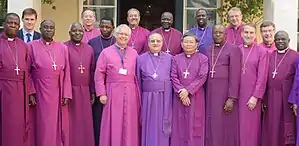Global South (Anglican)
The Anglican Global South is a grouping of 25 of the 40 provinces of the Anglican Communion, plus the Anglican Church in North America and the Anglican Church in Brazil as the 26th and the 27th members.

The provinces identified with the Global South represent most of the Southern Hemisphere and Third World provinces within the Communion, including all those from Africa, the largest from South America, most from Asia and two Oceania provinces. Global South provinces are characterized by their theological conservatism on matters of sexual ethics and life issues, and by their Evangelicalism in churchmanship. The grouping excludes the Episcopal Anglican Church of Brazil, the Anglican Church of Australia and the Anglican Church in Aotearoa, New Zealand and Polynesia, despite the fact that some Australian and New Zealand dioceses were already represented in their meetings, and the Asian provinces of Japan and Korea. The Anglican Church of Southern Africa is officially associated to the Global South and was already represented in several meetings, despite being more liberal than their African counterparts. The Anglican Diocese of South Carolina, which left the Episcopal Church in October 2012, was accepted into Global South in August 2014 with the Global South temporarily caring for the Diocese until a formal decision is made, with plans announced in 2016 to join the Anglican Church in North America formally requiring two formal votes at future Diocese annual conventions (2017 and 2018).[1]
The Global South encounters started in 1994. The Global South standing gained impetus concerning the controversies over the acceptance of non-celibate homosexuality, as the blessing of same-sex unions and the allowing of non-celibate homosexual clergy was being promoted by the Episcopal Church of the United States and the Anglican Church of Canada. The apex of the controversy took place with the consecration of Gene Robinson, a partnered homosexual, as bishop of the Episcopal Church in 2003. The Global South churches have since then vigorously opposed the legitimacy of any acceptance of same-sex relationships within the Anglican Communion. Several of the Global South Primates attended the GAFCON (Global Anglican Future Conference) that took place in Jerusalem in 2008, as an alternative to the Lambeth Conference. They also supported the creation of the Anglican Church in North America, in 2009, as a province in formation of the Anglican Communion and a theologically conservative alternative in the United States and Canada in opposition to what were viewed as revisionist departures that had taken place in these provinces concerning specifically human sexuality and the interpretation of the Bible. Archbishop Robert Duncan of the Anglican Church in North America was present at the Global South Primates Encounter that took place in Singapore, on 19–23 April 2010. The final statement declared: "We are grateful that the recently formed Anglican Church in North America (ACNA) is a faithful expression of Anglicanism. We welcomed them as partners in the Gospel and our hope is that all provinces will be in full communion with the clergy and people of the ACNA and the Communion Partners."[2]
The African Provinces are all members of the Council of Anglican Provinces in Africa (CAPA). The Global South makes regular pronouncements on the internal politics of the Anglican Communion, with particular emphasis upon issues of human sexuality, through a self-appointed Steering Committee, whose Chairman is the Most Rev. Mouneer Anis.[3]
The Global South issued a letter to the Crown Nominations Commission of the Anglican Communion, on 20 July 2012, signed by 13 Primates and representatives of other three churches, including the Anglican Church of Southern Africa, expressing his wish that the new Archbishop of Canterbury will remain faithful to the orthodoxy of the Anglican faith and work for the unity of the worldwide Anglican Communion.[4]
Provinces
- The Church of Bangladesh (United)
- The Anglican Church in Brazil
- The Province of the Anglican Church of Burundi (CAPA)
- The Church of the Province of Central Africa (CAPA)
- The Province of the Anglican Church of the Congo (CAPA)
- The Church of the Province of the Indian Ocean (CAPA)
- The Episcopal Church in Jerusalem and the Middle East (CAPA)
- The Anglican Church of Kenya (CAPA)
- The Church of Melanesia
- The Church of the Province of Myanmar
- The Church of Nigeria (CAPA)
- The Anglican Church in North America [5]
- The Church of North India (United)
- The Church of Pakistan (United)
- The Anglican Church of Papua New Guinea
- The Episcopal Church in the Philippines
- The Province of the Anglican Church of Rwanda
- The Church of the Province of South East Asia
- The Anglican Church of Southern Africa (CAPA)
- The Church of South India (United)
- The Anglican Church of South America
- The Province of the Episcopal Church of Sudan (CAPA)
- The Province of the Episcopal Church of South Sudan (CAPA)
- The Anglican Church of Tanzania (CAPA)
- The Church of Uganda (CAPA)
- The Church of the Province of West Africa (CAPA)
- The Church in the Province of the West Indies
See also
References
- Announcement regarding the Diocese of South Carolina, 22 August 2014.
- Fourth Trumpet from the Fourth Anglican Global South to South Encounter, 23 April 2010, Global South Official Website.
- Statement from the Global South Primates Steering Committee. London, March 13–15, 2008.
- Global South Letter to the Crown Nominations Commission, 20 July 2012.
- "Anglican Church in North America Declared Partner Province by the Global South". Anglican Church in North America. 2015-10-16.